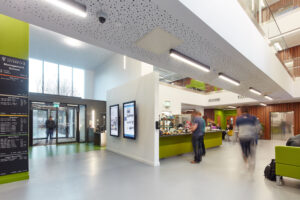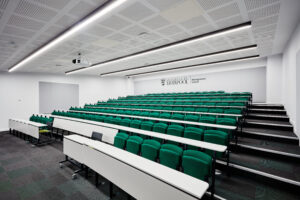Financial Computing
UCAS code GN34
- Study mode
- Full-time
- Duration
- 3 years
- Start date and application deadlines
-
- Start date
UCAS code GN34
Financial computing is at the very heart of the world’s global financial centres, from Wall Street to Chicago, London and Tokyo. This dynamic programme will develop your knowledge and skills in all aspects of financial services.
Study Financial Computing at Liverpool and learn to understand the underlying technology that powers modern financial markets and the financial theory that steers them.
Bringing together finance, economics and computing, this programme will develop your understanding of financial services by developing your knowledge and practical skills of algorithms; financial accounting; designing, implementing and evaluating software systems to analyse stock portfolios and operating financial markets.
Taught in conjunction with the Management School, your studies will be guided by experts in both computer science and financial services. After covering core elements in your first year, we subsequently give you the flexibility to tailor and focus your learning to your own interests or you can choose to maintain a balanced mixture of modules throughout your degree.

We’re proud to announce we’ve been awarded a Gold rating for educational excellence.
Discover what you'll learn, what you'll study, and how you'll be taught and assessed.
Year one of the programme has been designed as an even split between topics relating to computing and topics related to accounting, economics, finance and management.
In year one you will learn the fundamentals of computing, accounting, economics, finance and management. This initial broad scope will instil confidence to apply practical techniques such as making and recording financial transactions; expand on theories such as software design methodology; management decision making and microeconomics. You will also gain an all round understanding of what is expected from a computing professional in the current digital environment.
In year one students will typically undertake either COMP101 (Introduction to Programming) or COMP105 (Programming Language Paradigms) based on prior exposure to programming (eg Computer Science A level). Students without a computer science background will normally study COMP101, however in some instances may be permitted to enrol on COMP105 instead.
All other year one modules are required.
Programme details and modules listed are illustrative only and subject to change.
In year two you continue with a mix of modules related to computing, accounting, economics, finance and management but also have the opportunity to specialise in certain subject areas of your choice.
You will continue to develop your knowledge from your first year of study by being introduced to more complex and advanced theories and techniques whilst at the same time expanding upon already established standards and concepts. You will look to use real market data wherever possible to make theory come to live.
You will take all the compulsory modules listed, and select modules from the optional module list.
| Optional modules | Credits |
|---|---|
| ACCOUNTING THEORY (ACFI202) | 15 |
| BUSINESS IN THE GLOBAL ECONOMY (MKIB225) | 15 |
| COMPUTER AIDED SOFTWARE DEVELOPMENT (COMP285) | 7.5 |
| SCRIPTING LANGUAGES (COMP284) | 7.5 |
Programme details and modules listed are illustrative only and subject to change.
A major part of your studies in year three will be the Honours Year Automated Trading Project that you take part in as a member of a team. This project allows you to demonstrate practical competence in both research and development of computer-based trading strategies utilising everything learned across the programme.
You take all the compulsory modules listed, and you will also choose modules from the selected optional modules list.
| Compulsory modules | Credits |
|---|---|
| FINANCIAL RISK MANAGEMENT (ACFI342) | 15 |
| INTRODUCTION TO COMPUTATIONAL GAME THEORY (COMP323) | 15 |
| BUSINESS FINANCE (ACFI304) | 15 |
| HONOURS YEAR AUTOMATED TRADING PROJECT (COMP396) | 30 |
Programme details and modules listed are illustrative only and subject to change.
Teaching is by a mix of formal lectures, small group tutorials and supervised laboratory-based practical sessions. Students also undertake individual and group projects. Key problem solving skills and employability skills, like presentation and teamwork skills, are developed throughout the programme.
The main modes of assessment are through a combination of coursework and examination. Depending on the modules taken you may encounter project work, presentations (individual or group), and specific tests or tasks focused on solidifying learning outcomes.
We have a distinctive approach to education, the Liverpool Curriculum Framework, which focuses on research-connected teaching, active learning, and authentic assessment to ensure our students graduate as digitally fluent and confident global citizens.
The Liverpool Curriculum framework sets out our distinctive approach to education. Our teaching staff support our students to develop academic knowledge, skills, and understanding alongside our graduate attributes:
Our curriculum is characterised by the three Liverpool Hallmarks:
All this is underpinned by our core value of inclusivity and commitment to providing a curriculum that is accessible to all students.
The qualifications and exam results you'll need to apply for this course.
| Qualification | Details |
|---|---|
| A levels |
BBC (including Mathematics: B or Computer Science: B) |
| GCSE |
4/C in English and 4/C in Mathematics |
| BTEC Level 3 national extended diploma |
DDM in a relevant diploma. |
| BTEC combinations |
BTEC National Diploma DM plus B in Mathematics or Computer Science at A level; BTEC National Extended Certificate M plus BB including Mathematics or Computer Science at A level at grade B. |
| Welsh Baccalaureate Advanced |
C in the Welsh Baccalaureate, plus BB at A level to include Mathematics or Computer Science grade B. |
| Access |
Pass relevant Access to HE Diploma with 45 Level 3 credits with 27 at Distinction including 15 in Mathematical or Computer Science credits and 18 at Merit |
Studying with us means you can tailor your degree to suit you. Here's what is available on this course.
University of Liverpool students can choose from an exciting range of study placements at partner universities worldwide. Choose to spend a year at XJTLU in China or a year or semester at an institution of your choice.
Immerse yourself in Chinese culture on an optional additional year at Xi'an Jiaotong Liverpool University in stunning Suzhou.
Broaden your world by spending an additional year of study at a partner university abroad following your second year of study.
Take a semester of your second year of study at one of our worldwide partner institutions.
Spend a summer abroad on a study placement or research project at one of our worldwide partner institutions.
Year in industry placements give you an in-depth workplace experience where you can develop your skills and apply your learning.
If you'd like to undertake a year in industry, you can transfer to Financial Computing with a Year in Industry BSc (Hons) during your studies, subject to meeting the academic requirements of your course.
To spend a year in industry, you'll need to secure a placement with an organisation. If you're unable to find a placement, you'll continue with the standard version of the course without a year in industry.
Every student at The University of Liverpool can study a language as part of, or alongside their degree. You can choose:
Students studying Information Management and Information Systems BSc at XJTLU can study this course at the University of Liverpool. Read more about Financial Computing BSc (Hons) as part of the 2+2 programme .
The natural next step for ambitious XJTLU students who want to build a brilliant career.
Computer science is housed in a grade II listed building which has been extensively refurbished for 21st century needs and challenges and provides state-of-the art equipment and high-speed communication links. The Management School is home to a state-of-the-art Bloomberg Suite resembling a professional trading floor.






From arrival to alumni, we’re with you all the way:

The University has also provided me with the best opportunities to meet amazing people in my field through networking events.

Want to find out more about student life?
Chat with our student ambassadors and ask any questions you have.
Liverpool’s computer science graduates go onto well-paid graduate jobs and careers such as computer programmer, software developer, systems analyst, software engineer, technical consultant, and web designer.
Computer science graduates will enter a high-in-demand pool in the field with possible roles in:
Recent employers include:
87% of computer science students find their main activity after graduation meaningful.
(Graduate Outcomes, 2018-19.)
Hear what graduates say about their career progression and life after university.

Graduating from Computer Science in 2020, Nachi describes her time at the University of Liverpool and how it has prepared her for first role after University.

Graduating from Computer Science in 2013, Kirsty describes her time at the University of Liverpool and how she is now running her own tech startup.
Your tuition fee covers almost everything, but you may have additional study costs to consider, such as books, specialist equipment or field trips.
Full-time place, per year - £9,535
Year in industry fee - £1,905
Year abroad fee - £1,430 (applies to year in China)
Full-time place, per year - £29,900
Year in industry fee - £1,905
Year abroad fee - £14,950 (applies to year in China)
The tuition fees shown are correct for 2025/26 entry. Please note that the year abroad fee also applies to the year in China.
Tuition fees cover the cost of your teaching and assessment, operating facilities such as libraries, IT equipment, and access to academic and personal support. Learn more about paying for your studies.
We understand that budgeting for your time at university is important, and we want to make sure you understand any course-related costs that are not covered by your tuition fee. This could include buying a laptop, books, or stationery.
Find out more about the additional study costs that may apply to this course.
We offer a range of scholarships and bursaries that could help pay your tuition and living expenses.
If you’re a UK student joining an undergraduate degree and have a household income below £35,000, you could be eligible for a Liverpool Bursary worth up to £2,000 for each year of undergraduate study.
Apply for an Asylum Seekers Scholarship and you could have your tuition fees paid in full and receive help with study costs. You’ll need to have applied for asylum in the UK, or be the dependant of an asylum seeker, and be joining an eligible undergraduate degree.
If you’ve spent 13 or more weeks in Local Authority care since age 14, you could be eligible for a bursary of £3,000 per year of study. You’ll need to be a UK student joining an eligible undergraduate degree and be aged 28 or above on 1 September in the year you start.
Are you a UK student with a Black African or Caribbean heritage and a household income of £25,000 or less? You could be eligible to apply for a Cowrie Foundation Scholarship worth up to £8,000 for each year of undergraduate study.
If you’re a UK student identified as estranged by Student Finance England (or the equivalent UK funding body), you could be eligible for a bursary of £1,000 for each year of undergraduate study.
Joining a School of Biosciences degree and have a household income of less than £25,000? If you’re a UK student, you could apply to receive £4,500 per year for three years of your undergraduate course.
Do you live in the Liverpool City Region with a household income of £25,000 or less? Did neither of your parents attend University? You could be eligible to apply for a Nolan Scholarship worth £5,000 per year for three years of undergraduate study.
Are you a UK student with a household income of £25,000 or less? If you’ve participated in an eligible outreach programme, you could be eligible to apply for a Rigby Enterprise Award worth £5,000 per year for three years of your undergraduate degree.
Are you a UK student with a household income of £25,000 or less? Did neither of your parents attend University? You could be eligible to apply for a ROLABOTIC Scholarship worth £4,500 for each year of your undergraduate degree.
Apply to receive tailored training support to enhance your sporting performance. Our athlete support package includes a range of benefits, from bespoke strength and conditioning training to physiotherapy sessions and one-to-one nutritional advice.
Joining a degree in the School of Electrical Engineering, Electronics and Computer Science? If you’re a UK student with household income below £25,000, you could be eligible to apply for £5,000 a year for three years of study. Two awards will be available per academic year.
If you’re a young adult and a registered carer in the UK, you might be eligible for a £1,000 bursary for each year of study. You’ll need to be aged 18-25 on 1 September in the year you start your undergraduate degree.
Use our handy chatbot for your Clearing enquiries.
Last updated 17 June 2025 / / Programme terms and conditions